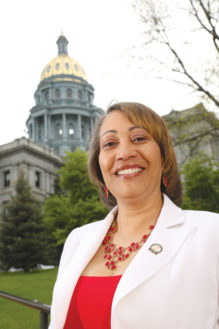
Rep. Angela Williams
A 2016 legislative session some have termed “do-nothing” will nevertheless foreshadow big changes for northeast Denver. All five of the area’s state legislators—two senators and three representatives—are leaving their posts. And, voters can expect a half-dozen ballot initiatives to address major issues unresolved by the General Assembly.
Sens. Mike Johnston (District 33) and Pat Steadman (District 31) as well as Reps. Lois Court (District 6) and Beth McCann (District 8) are term-limited. Rep. Angela Williams (District 7), who is finishing her third term, has chosen to seek the District 33 senatorial seat. Court is running for Steadman’s seat and McCann is busy campaigning for Denver district attorney.
Our legislators continue to chafe at the fiscal constraints imposed primarily by the Taxpayers Bill of Rights (TABOR). In their unanimous opinion, that constitutional amendment passed by the voters in 1992 ensures that the state budget will continue to force the state to fall behind in needed expenditures for major programs like transportation and education. All hold out hope there will be a ballot issue this fall calling for a 10-year “time-out” from TABOR’s revenue cap.
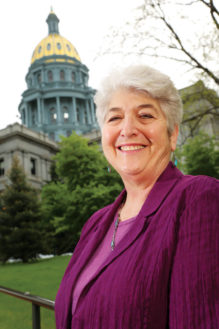
Lois Court
Some also hope the governor will issue a special session “call” to once again push for re-classification of the Hospital Provider Fee (HPF) to an enterprise fund. This would have the effect of lowering general fund revenues far enough below the TABOR cap that several hundred million dollars could be made available for transportation and education. As with many bills considered by the legislature this year, that bill failed largely along party lines. Republicans hold a one-seat majority in the Senate while in the House, Democrats have a three-seat majority.
Other such failures included changes to the presidential primary election process, efforts to reduce penalties for juveniles who engage in sexting, and reforms to the construction defects legislation. One or more of those issues may find their way to the November ballot.
Ironically, one bill that did benefit from bipartisan support, the grocery store liquor sales bill, faced an uncertain future at press time due to a potential veto by the governor. Even if the governor signs off on Senate Bill 197, there remains a good chance this issue too will be subject to a November ballot initiative.
But, outside the purely fiscal arena, the legislators expressed pride and satisfaction at their accomplishments in the 120-day session that ended at midnight May 11. Many of the bills they drafted and supported were passed (see sidebar story for a selection of their bills). Each of the legislators applauded the accomplishments in these areas:
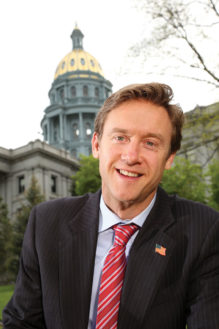
Sen. Mike Johnston
State budget.
Through fiscal maneuvering, major cuts initially proposed by the governor to balance the budget were avoided. Per pupil average spending for K-12 schools was increased by $122 to $7,425, a $20 million cut to higher education was averted, transfers to the state’s highway fund were set at $150 million and the state was able to maintain its statutory 6.5 percent budget reserve. Sen. Steadman and others caution that a one-year fix to address a $100 million court-mandated rebate on severance taxes will need a permanent solution in future sessions.
School finance act.
Progress was made at reducing procedural and resource limitations on charter schools.
Tax expenditure study. Rep. Court, in particular, was pleased that a bill passed to establish a task force to evaluate whether the state is getting “bang for the buck” for the various tax credits and deductions approved over the years that now amount to $3.5 billion.
Criminal justice reform.
A major thrust here is to recognize that juveniles are different psychologically from adults and every effort should be made to focus on prevention, diversion and rehabilitation. There appears to be a growing consensus that this benefits the individual perpetrator and has a high return on investment for society. At the same time, the sentences and the statute of limitations were strengthened for sexual assault and strangulation crimes.
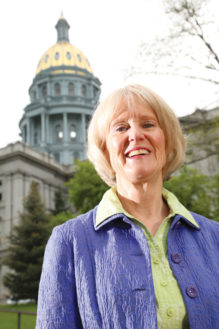
Rep. Beth McCann
As usual, the 2016 session kept legislators busy until virtually the last minute of the legal limit and working hours extended late into the evenings. Some legislators looked forward to catching up on sleep and getting back on the campaign trail. Johnston equates his departure to a high school graduation, “heading off to college” and not rejoining his old classmates in the fall.
Speaking of that next step in his political career, Johnston acknowledged that he is “taking a serious look” at running for governor in 2018 saying, “there is nothing formally in discussion but it’s one long-term option.”
Court says she has been asked by many people to continue in the legislature and maintains a passion for it: “If you have a brain, use it. If you are a member of a community, participate in it.” She hopes to continue to work on solving Colorado’s “fiscal Gordian knot” as well as an end-of-life bill, campaign finance and election law in general.
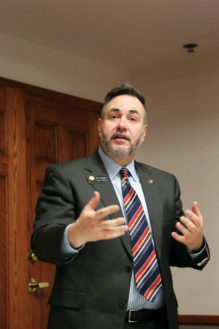
Sen. Pat Steadman
Williams’ immediate future is similar: the campaign for a Senate seat and the Democratic primary in June. Williams says she will continue to focus on the budget, improving the state’s small business climate and solving the issue of trust between neighborhoods and law enforcement.
McCann says her departure from the legislature is “bittersweet” and reflects on how much she has learned in terms of the issues and perspectives of people from all over the state. Her political future could also be decided in the very short term as she faces fellow Democrat Michael Carrigan in the June 28 primary (see article on page 12).
Steadman says he doesn’t support term limits “but I’m not sorry that it’s happening to me.” Despite the rigors of the 120-day session, his enthusiasm for political office bubbles over: “I love the legislative process, I love the policy debates, and I love the satisfaction of knowing I’ve made Colorado a better place.” Steadman has no immediate plans but expects to be campaigning in the fall in support of ballot issues including re-authorization of the Scientific and Cultural Facilities District.
The deadline for the governor to sign or veto bills is June 10. A special session would have to be called after the June 28 primary and would likely result in participation by some legislators as lame ducks since many of the sitting members are facing contested primary races.



0 Comments